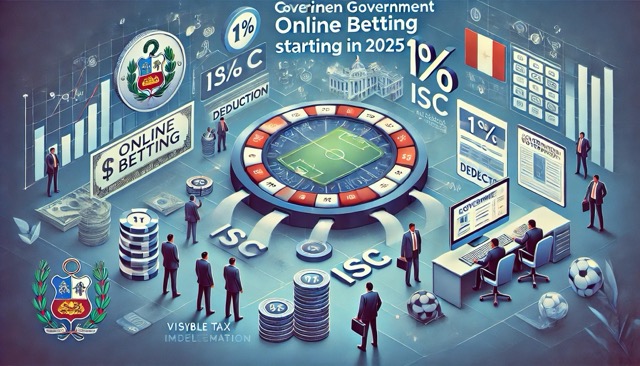
Starting in January 2025, Peru will implement a new tax on online sports betting and gaming as part of a broader regulatory effort to better control this growing market and ensure companies contribute to the tax system. The measure includes the Selective Consumption Tax (ISC), which will amount to 1% of each wager placed, in addition to the existing 12% tax on operators’ net income, known as Gross Gaming Revenue (GGR).
The 1% ISC will be automatically deducted from each bet, whether in cash or bonuses. For bets placed in foreign currencies, the official exchange rate of the day will be used to calculate the tax. These measures aim to ensure fair and transparent operations across all platforms.
However, this new tax has raised questions about its impact on operators and players. Online betting platforms will need to update their technological systems to properly apply the 1% ISC, a process that could take months. Authorities have also established that these updates must be approved by the government before being implemented. Failure to comply with the new rules could result in fines or even license revocations for operators.
Additionally, the combined tax burden of the 12% on net income and the 1% ISC significantly increases operating costs. In percentage terms, this new tax structure could reach 32% of total generated income, raising concerns about the economic viability of operations in the country. Operators may need to transfer some of these costs to users, potentially making betting more expensive and discouraging participation.
The Ministry of Economy and Finance (MEF) has outlined that the ISC will apply when funds are deducted from a player’s account to place a bet, either in cash or bonuses. For transactions in foreign currency, the official exchange rate established by the Superintendence of Banking, Insurance, and AFP (SBS) will be used. This approach aims to ensure strict control over tax collection and consistent application across all platforms.
The online betting sector faces several scenarios as these regulations take effect. First, companies will need to invest in technology to comply with the new tax rules and avoid regulatory penalties. Second, players may react to higher costs associated with betting, which could influence participation levels. Additionally, the increased tax burden may drive some users toward unregulated or illegal platforms, affecting fair competition and reducing the effectiveness of fiscal measures.
Legally, these regulations could spark debates about the constitutionality of the imposed tax rates, especially if they are deemed excessive or confiscatory. Industry stakeholders have already pointed out that the combination of the ISC and the net income tax could exceed acceptable limits set by legal precedents in Peru. This suggests that both the government and operators will need to work together to ensure a smooth and effective transition to this new tax regime.
Ultimately, the implementation of the ISC in 2025 marks a pivotal step by the Peruvian government to regulate and oversee the online betting market. However, this initiative brings significant technical, economic, and legal challenges that could impact the industry’s growth and user experience. Collaboration and adaptability among all stakeholders will be essential to ensuring the success of these measures while minimizing unintended consequences.








